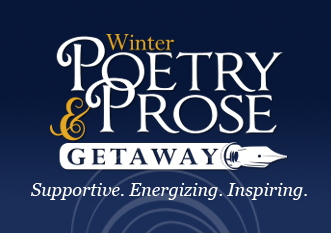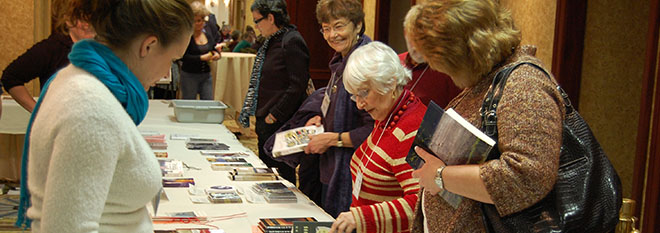This entry is part of Getaway Reads, a weekly e-mail series curated by Stephanie Cawley that features the writing of the Winter Poetry & Prose Getaway faculty.
Face to Face:
Loss and Homecoming at the 25th Reunion
by Anndee Hochman
I didn’t expect to cry after just two hours on the Old Campus. Then again, I had few expectations for my 25th college reunion. For the previous four months, thoughts of returning to New Haven had been eclipsed by a more urgent matter: the rapidly declining health of my 77-year-old father-in-law.
It was prostate cancer. In April, Alvin teetered as he walked down his apartment hallway. By mid-May, he was nearly bedridden. Four days before our reunion, my partner left for Denver to hold vigil by her father’s side. I got on the train to New Haven, cell phone pressed to my hip.
As we shot past Metro Park, I paged through the reunion packet: a crammed agenda of lectures, tours, concerts and plays. For a moment, I felt the same paralysis that had seized me for most of freshman year. I recall leafing through the course catalogue, weighing possible life paths: Could I be an architect? A sociologist? A scholar of Renaissance literature? Back then, the future felt tantalizing and wide, buoyant and scary.
At Union Station, I called my partner for an update: her dad’s breathing was ragged, his body temperature vacillating. A few weeks earlier, Alvin had declared that his idea of freedom was “thinking about a future in which I don’t have to think about the future.” Now he wasn’t talking at all.
Meanwhile, I schlepped my bag up to Lawrance Hall, a rehabbed suite I’d be sharing with my old roomies. Leaded glass windows, chaste twin beds and little gut-punches of nostalgia: Maxine’s make-up scattered around the sink, Pam’s shoes parked in the middle of the floor. Later, a cappella singing swelled Woolsey Hall, where I remembered fanning myself with a graduation program as the university’s president quoted a Talmudic proverb: “You are not required to complete the work, but neither are you permitted to desist from it.”
I wandered the flagstone paths, stopping to talk: the guy who’d sat near me in Bio for Poets; people I swore I’d never seen before. We were hungry to learn what had happened to one another after May 1984. And not just the CV highlights; our talk veered toward the back-stories, the places where our lives had spun off course.
I heard about an engagement cancelled eight weeks before the wedding, about an unplanned third child, a novel written but never published, a fiancé dead at 41, a kindergarten son with a predilection for pink dresses. I told people about the ways my own life had startled me—about leaving the Washington Post, moving far from Philadelphia, about coming out as a lesbian (surprise!), running a marathon (bigger surprise), suffering panic attacks in my 20s, becoming a parent at nearly 40.
There is the public reunion, under the big tent, where we squint (despite those bifocals) at plastic nametags. And there is the other, private, reunion, where your college-aged self collides with your middle-aged self for a moment of reckoning: Can you fold that 20-year-old—yeah, the one binging on chocolate-covered raisins and worrying about her Chaucer paper—in a rueful embrace and laugh about what a short, strange trip it’s been?
Maybe my defenses were softened by months of family crisis, or maybe I was following the lead of my father-in-law, a professor of communication for whom conversation was the surest form of prayer. I found myself vaulting past small talk: “How have you changed? Why did you call off the wedding? What do you want from the next ten years?”
I sensed, at a quarter-century post-graduation, a feeling of contentment, deeper and different from complacency or self-satisfaction. We’d been adults long enough to amass losses and failures, rough patches, plans gone awry: We were in the rich middle of our lives, neither completing nor desisting—just weathering the storms and trying, still, to do some good.
I’d been at the reunion for two hours when my phone buzzed. “He died,” Elissa said, her voice thick with tears. “It was quiet….Oh, sweetie, he’s gone.”
In three days I would shovel Denver dirt into my father-in-law’s grave. I would listen to my brother-in-law play an aching clarinet solo at the service. I would enter a new chapter of my adult life—the one in which we end up, all of us, orphans. But before that, I would sit at a large, round table, eyes stinging, dinner napkin held aloft, and join the class of ’84 in singing about “the shortest, gladdest years of life.”
Here’s the thing: They’re not. The years just keep getting shorter, and the gladdest moment is this one. As we sang “Bright College Years,” as we flapped our napkins in that goofy ritual, I could hear my father-in-law urging me on: Ask real questions. Listen for real answers. Connect, connect, before the light goes out.
© Anndee Hochman. Originally published in The Philadelphia Inquirer, March 16, 2011.
+ + + + + + + + + +
Anndee Hochman writes feature articles, profiles, and essays about education, health, and the wide, quirky spectrum of family and community life, including issues of adoption, foster care, reproductive technology, same-sex couples, and intentional community. In addition to her regular pieces in the Philadelphia Inquirer, her work has appeared in O, the Oprah Magazine, Health, Working Mother, Marie Claire, and online in Literary Mama. She is the author of Anatomies: A Novella and Stories (Picador 2000) and Everyday Acts & Small Subversions: Women Reinventing Family, Community and Home (The Eighth Mountain Press, 1994). For the past eighteen years, Anndee has taught writing to children, teens, and adults in a variety of settings, including schools, senior centers, and a small fishing village on Mexico’s Pacific coast. Her website is www.anndeehochman.com.
+ + + + + + + + + +
Want to study with Anndee Hochman? At the 2013 Winter Poetry & Prose Getaway, Anndee will be teaching the Turning Memory into Memoir workshop. Click here to find out more.
+ + + + + + + + + +
Advance your craft and energize your writing at the Winter Poetry & Prose Getaway. Enjoy challenging and supportive sessions, insightful feedback, and an encouraging community. Learn more.





Woe a cool read. Don’t know if I could do a reckoning w my 20-year-old self. We drew so many harsh lines in our sands and then kept moving them. Life was like a four year old’s scribble paper… So sorry for your loss gfriend. Death is most definitely the weirdest aspect of life. Who can know it? And who can forget about it for more than a week?
Glad you liked the piece, Carol. I’ll let Anndee know you commented. — Stephanie, Curator, Getaway Reads
In May, I attended my 30th Reunion with my husband, who graduated from the same college the year after me. And it was the weekend of my elder daughter’s graduation, also from the same college. I found Reunion to be baffling and somewhat like entering a foreign country where I knew the language but wasn’t fluent in it. I didn’t recognize many people and it made me realize how far I’ve come since that time, how much more mature and confident and intelligent. Your beautiful essay describes the way I imagine college reunion should be, setting aside the death of a beloved parent. My condolences on your loss. Your recollection of your father-in-law’s wise words will, I hope, carry you through the grief you and your partner bear. Thank you for sharing your essay. PS – I’ve copied the Talmudic proverb to my notebook because I want to re-read it, and think about it, and probably write about. Thank you.
I love that proverb, too! And I’m glad you enjoyed reading the piece. — Stephanie, Curator, Getaway Reads
Well written. Similar thoughts on my college 25th reunion. So many of us yearn to go back and attempt to relive a time of our unencumbered past. Yet you chose to use the event as an opportunity to move forward by sharing some life experiences and soliciting the same from others that have attached us to our temporal existence. That, mixed with your personal loss reflects the bitter-sweet moments that too often embody such milestones in our lives.
I’m glad you related to the piece so strongly. I, too, like the way Anndee resists simple nostalgia in this piece for something deeper. — Stephanie, Curator, Getaway Reads